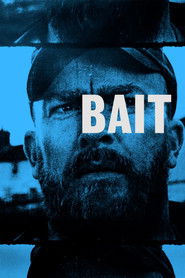Bait's distinct visual and monoaural aesthetic really adds something to the sense of tension, as does the self-consciously deliberate clumsy editing. What is interesting for this Brit at least, is that the screenplay is a little heavy-handed in its commentary on the AirBnb class (with their reclaimed 'fisherfolk' cottages and straight-outta-Oxbridge Hugos). Yet it somehow doesn't seem to blemish the film at the same time, kind of like how Eistenstein's Battleship Potemkin is hardly tarnished by its Soviet politics as heavy as the film's namesake. In terms of other reference points, though, the visuals bring to mind the cinephilic nostalgia of Guy Maddin and the lo-fi spatial and tonal qualities of Bait's acoustic soundscape recall the fractally fascinating aural world of Djibril Diop Mambéty's Touki Bouki (1973).
A drama on what might be the rather hackneyed theme of tourists ruining Cornwall becomes a bizarre expressionist melodrama. It has the huge closeups and crashingly emphatic narrative grammar of early cinema and, like home movies, it has non-diegetic sound, with dialogue overdubs and ambient noise which could well be taken from a sound effects LP. But it’s very effective, and the monochrome cinematography desentimentalises the Cornish landscape, turning it into an anti-picture postcard. The weirdness of Bait can’t be overestimated, like FW Murnau directing an episode of EastEnders.
— Peter Bradshaw (The Guardian)
Synopsis: Martin Ward is a cove fisherman, without a boat. His brother Steven has repurposed their father’s vessel as a tourist tripper, driving a wedge between the brothers. With their childhood home now a getaway for London money, Martin is displaced to the estate above the picturesque harbour. As his struggle to restore the family to their traditional place creates increasing friction with tourists and locals alike, a tragedy at the heart of the family changes his world.

